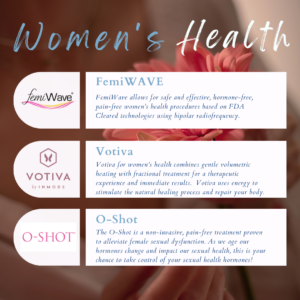
Hormones play a crucial role in maintaining the delicate balance within the female body, influencing various physiological processes such as metabolism, mood, and reproductive health. When this balance is disrupted, it can lead to a myriad of symptoms that affect both physical and emotional well-being. In this blog post, we will delve into the signs, symptoms, and causes of hormone imbalance in women, and explore healthy approaches to restore harmony to the endocrine system.
Understanding Hormone Imbalance
Hormone imbalance in women can manifest in various ways, and the signs and symptoms may differ from person to person. However, some common indicators include:
- Irregular Menstrual Cycles: Hormonal fluctuations can disrupt the regularity of menstrual cycles, leading to irregular periods or even amenorrhea (absence of menstruation).
- Mood Swings and Emotional Disturbances: Hormones have a profound impact on mood regulation. Imbalances may result in mood swings, irritability, anxiety, or even depression.
- Changes in Body Composition and Metabolism: Hormones influence metabolism and can contribute to weight gain or difficulty in losing weight, especially around the abdominal area.
- Skin Issues: Hormonal fluctuations can contribute to skin problems such as acne, dryness, or excessive oiliness.
- Fatigue and Low Energy: Hormone imbalances may lead to chronic fatigue and a general lack of energy.
Common Causes of Hormone Imbalance
Several factors can contribute to hormone imbalance in women, including:
- Stress: Chronic stress can disrupt the balance of hormones such as cortisol and adrenaline, impacting the entire endocrine system.
- Diet and Nutritional Deficiencies: Poor dietary choices and deficiencies in essential nutrients can affect hormone production and function.
- Lack of Exercise: Physical activity plays a crucial role in hormonal balance. Sedentary lifestyles can contribute to hormonal disruptions.
- Environmental Toxins: Exposure to endocrine-disrupting chemicals in the environment, such as certain pesticides and plastics, can interfere with hormone function.
Healthy Approaches to Hormone Balance
- Balanced Nutrition: Adopting a nutrient-dense, balanced diet can support hormone production. Include whole foods, plenty of vegetables, and essential fatty acids.
- Regular Exercise: Engage in regular physical activity to promote overall well-being and balance hormones. Both aerobic and strength-training exercises can be beneficial.
- Stress Management: Incorporate stress-reducing practices such as mindfulness, meditation, yoga, or deep breathing exercises to keep cortisol levels in check.
- Adequate Sleep: Prioritize quality sleep as it plays a vital role in hormonal regulation and overall health.
- Herbs and Supplements: Certain herbs, such as maca root, chasteberry, and ashwagandha, have been traditionally used to support hormonal balance. Several supplements, such as DHEA, magnesium, B vitamins, fish oil, and vitamin D, can be used to support hormonal balance.
- Limit Exposure to Environmental Toxins: Be mindful of environmental factors by choosing organic produce, avoiding plastic containers, and using natural cleaning products.
Achieving and maintaining hormonal balance is a holistic journey that involves addressing lifestyle factors, nutrition, and overall well-being. By understanding the signs, symptoms, and causes of hormone imbalance, women can empower themselves to make informed choices that promote hormonal harmony. Embracing a holistic approach not only addresses the symptoms but also promotes long-term health and vitality!
Have questions? Contact us at EWLiving.Info@Gmail.com or 601-724-7882
Contact us for your free phone consultation!
Votiva for Her Votiva Testimonials O-Shot for Her GAINSWave for Him P-Shot for Him





